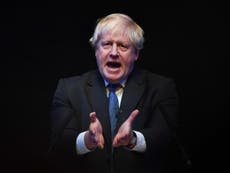Boris Johnson's leadership chances just increased – but in the current climate of Brexit chaos there’s no time for another election
Boris decided to do some homework, for a change. It's a shame for him that it's come at the wrong time – but not so much for the rest of us
Just in case the Conservative Party were in any danger of forgetting about Boris Johnson, he took the opportunity to remind friends and enemies alike of his undoubted talents with a fringe appearance that was better attended and more enthusiastically received than many in the main conference hall.
In style, it was a bravura performance, of typical Johnsonian audacity and, to be fair to him, some intellectual substance. Plainly, he had decided to do some homework, for a change. Seasoned Borisologists will have noted that his speech was trialled in advance, which suggested that this was not some last-minute essay. When his former friend and ally Michael Gove stabbed him in the front in the farcical Tory leadership contest in 2016 it was thought to be because Mr Johnson lacked application. He has at least made an effort this time, if only for the sake of the country.
Rather it was a well-constructed critique of his party leaders’ plans for Brexit, and, even more ominously, ranged freely across the political landscape. Boris had something to say about tax, about housing, about how to beat the “Tony Benn tribute band” that is today’s Labour Party, and about what the Conservatives should stand for. He had a few good jokes, some classical allusions that may have been lost on some, and a few hackneyed anecdotes. Overall, Mr Johnson ended his speech a more dangerous threat to the current leadership than he began it. He will certainly have given his audience some pause for thought.
But Boris is wrong. His attacks on the Chequers plan may have intellectual consistency, and the prime minister’s proposals may have flaws and contradictions that have become all too well publicised in recent weeks. Although he chose not to rub it in, Theresa May has also seen her ideas rejected by the EU 27, fairly or not, which prompted her angry riposte when she returned from the Salzburg summit.
However, the Boris plan – for a free trade deal or even trading with the EU on Wold Trade Organisation terms – would inflict vast damage on the British economy. In his interview earlier this week the chancellor, Philip Hammond, revealed that during his many conversations with Mr Johnson about Brexit, the former foreign secretary never had any proper answer to the various well-known objections to a so-called hard Brexit.
According to the chancellor: “Boris sits there and at the end of it he says ‘yeah but, er, there must be a way, I mean, if you just, if you, erm, come on, we can do it Phil, we can do it. I know we can get there.’”
Despite the rhetorical flourishes and glorious visions, Mr Johnson didn’t do much better than that in Birmingham. Entertaining as ever, he pointed to the export successes of companies in his constituency of Uxbridge, and to the vast opportunities for trade with the rest of the world, but gave no indication that he knew the damage that he was proposing to do to our trade with our closest neighbours. Moreover, there is at present nothing stopping the UK from exporting more to Peru, to give one of his examples, as the Germans consistently show in almost every third country marketplace.
Nor did the rest of Mr Johnson’s plans add up. In principle, he may be right to argue, if only implicitly, that the only way to make his model of Brexit succeed is to turn the UK into an entrepreneurial powerhouse, cutting regulations and with a pledge, in his words to ensure “no new tax increases”. The unspoken assumption is that the UK will require a thoroughly Thatcherite solution to make its way in the world – a smaller state.
Yet he also wanted more education and training for the young, a housing revolution, and an immediate cash injection for the NHS. Mr Johnson is either in denial about the economic cataclysm that a hard Brexit will inflict on the country, or he sincerely believes that some mystical “believe in Britain” and spirit of national self-confidence will swiftly compensate for a collapse in investment and job creation.
At the start of his performance – there is no better word for it – Mr Johnson teased the chancellor, that when Mr Hammond said that Mr Johnson would never become prime minister that was one Treasury forecast that had the “ring of truth” about it. Whether Mr Johnson believed that or not, it remains the case that his personal standing among those who know him best – Conservative MPs – is not strong enough to see him through to a ballot of party members.
Besides, there is little appetite among the broad ranks of the Conservative Party for a leadership contest in the middle of crucial EU talks. Some may continue to harbour doubts about his reliability, and be disturbed by what they hear about his private life. He is, in short, a risk.
The truth is, time is running out for Mr Johnson, and he knows it. It might not be too late to “save Brexit” as he puts it, but it is surely too late for his personal ambitions to be fulfilled. He will join the distinguished ranks of “the best prime ministers we never had”, which is probably more than he deserves.



Join our commenting forum
Join thought-provoking conversations, follow other Independent readers and see their replies